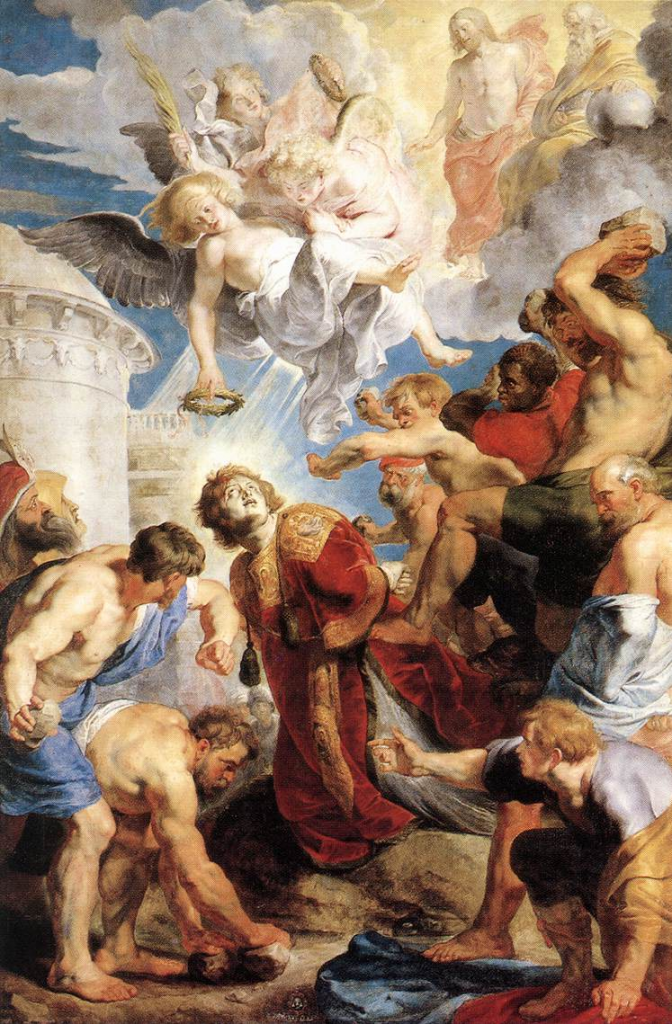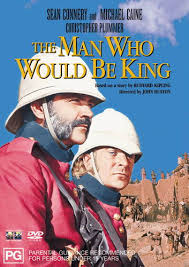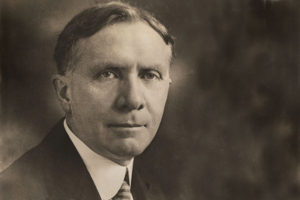Mount Calvary Church
Eutaw St.and Madison St.
Baltimore
Hymn: The Son of God Goes Forth to War
The Son of God goes forth to war
A kingly crown to gain.
His blood-red banner streams afar;
Who follows in His train?
Who best can drink His cup of woe,
Triumphant over pain,
Who patient bears his cross below–
He follows in His train.
The Son of God Goes Forth to War was written by Reginald Heber (1783-1826), Anglican Bishop of Calcutta for the feast of St. Stephen, the first martyr. It alludes to Rev. 6: 2: And I saw, and behold, a white horse: and He that sat on him had a bow, and a crown (Greek: stephanos) was given unto him; and He went forth conquering, and to conquer.
Rubens: The Martyrdom of St. Stephen
Stephen is also referred to in the second stanza.
The martyr first whose eagle eye
Could pierce beyond the grave,
Who saw His Master in the sky
And called on Him to save.
Like Him, with pardon on His tongue,
In midst of mortal pain,
He prayed for them that did the wrong–
Who follows in his train?
The martyr is the Christian most closely conformed to Christ by sharing in his sufferings and death. Like Jesus, the martyr prays that those who kill him be forgiven. The twentieth century saw more martyrs than all the previous centuries as Christians were killed in Spain, Germany, the Soviet Union, and other Communist countries. The twenty-first century has seen thousands of Christian men, women, and children beaten to death, decapitated, crucified, or burned alive solely because they were Christians. It puts our sufferings, as serious as they sometimes are, into perspective. They are a small sharing in the One Sacrifice.
A noble army, men and boys,
The matron and the maid,
Around the Savior’s throne rejoice,
In robes of light arrayed.
They climbed the steep ascent of heav’n
Thro’ peril, toil, and pain.
O God, to us may grace be giv’n
To follow in their train!
The hymn was sung as the body of Florence Nightingale was lowered into the grave because of its reference to sacrifice. The hymn is rarely sung (and is not in the 1982 Episcopal Hymnal) because of its reference to warfare. But in spiritual warfare victory is obtained not by killing but by dying. The Christian, following Jesus, conquers by sacrificing his or her life for others.
The hymn was sung in the 1975 film The Man Who Would Be King (based on Rudyard Kipling’s story) to the tune of The Minstrel Boy.
Here is another setting : harder to sing, but a powerful melody.
Ordinary: Missa de Sancta Maria Magdalena
Offertory: Georg Frederick Handel (1685-1759): I Know That My Redeemer Liveth
The Air for soprano “I know that my Redeemer liveth” draws from both Job and Paul. It begins with the “ascending fourth,” a signal observed by musicologist Rudolf Steglich as a unifying motif of the oratorio, on the words “I know,” repeated almost every time these words appear again. “For now is Christ risen” is pictured in a steadily rising melody of more than an octave. (Wikipedia)
Communion: Thomas Tallis (1505-1585): The God of Love My Shepherd Is. This metrical version of Psalm 23 was written by George Herbert (1593-1633).
William P. Merrill
Closing: Rise Up O Men of God. This was written in 1911 by the Presbyterian pastor William P. Merrill (1867-1954) to support the men’s movement in the church, in which men were called to take up the work of reforming society on Christian principles. Lee Podles discussed this movement in his third talk on men and the church. Some object to the masculine emphasis and seemingly belligerent tone of the hymn, others detect the odor of optimistic liberal Protestantism, and Calvinists think it should be rewritten as “Sit down O men of God, You cannot do a thing.” Merrill was a pacifist and president of the Church Peace Union, and echoes the message of the first hymn, The Son of God Goes Forth to War. We “tread where His feet have trod” by climbing Mount Calvary; not by killing, but by sacrificing ourselves even for those who would kill us.
A noble army, men and boys,
The matron and the maid,
Around the Savior’s throne rejoice,
In robes of light arrayed.
They climbed the steep ascent of heav’n
Thro’ peril, toil, and pain.
O God, to us may grace be giv’n
To follow in their train!




linked